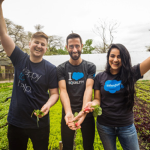When it comes to change management in business, one thing is never in doubt. The most successful cross-company collaborations happen when organisations share core values. In the first part of this article, I spoke about the need to clarify the ‘why’ for change, and how it’s essential to tell a story that evocatively engages with all stakeholders if you want to make change stick. It’s certainly much easier to tell a powerful story across different organisations when you share a common springboard, such as the values of trust and integrity. And it’s also much easier to remain outcome-led when you’re guided by these principles, even in the midst of substantial change.
Outcome statements light the way
Marc Benioff’s Trailblazer book describes Salesforce’s vision for the future of business as one in which everyone is empowered to change the world. Having worked for the organisation for over five years, and been a customer for 10 years before that, I can confirm it’s been a truly amazing place to be my authentic self and drive incredible change.
I think this is reflected in our people, and how they turn up. I also think this is reflected in the most successful of our change management collaborations with customers. Recently, we’ve done some incredible work with Standard Bank, a South African financial institution with a global presence. One of their vision statements is, ‘Africa is our home. In every corner, individuals and businesses are working relentlessly to achieve their dreams. This is an outcome statement that truly inspires and can drive performance.
Thomson Reuters, the leading provider of business information services, also has a strong statement of integrity, ‘Together, we help inform the way forward to a more understanding, trusting world for all’. Having worked in that business, I can tell you first-hand that this is genuinely a guiding light. You can see it in how the company has handled challenges they’ve faced around fake news, for example, and you can see it in the people who work there. There’s a fascinating story about how this ethos permeates their culture too, which involves having an orange chair in every room. This chair is for the customer and it’s a visual reminder that if no one is sitting in it, there’s someone missing from the room. It’s a way of using infrastructure to make a very deliberate, intentional focus on outcomes around purpose.
The scope of control
When we’re thinking about being outcome-led, a common pitfall is to look at the change we’ve had thrown at us, such as Covid and the war in Ukraine, and feel that much is outside our scope of control. However, analysis from BCG shows that just 9% of performance in previous downturns is explained by macro-economic factors, 19% has something more broadly to do with specific industries, and a huge 72% is company-specific. The idea that we control more than we think is key because, actually, nothing is ever static.
In fact, I was on a panel session recently, talking about a change management project, and was asked the question, “When will we be finished?” I love that question because, when it comes to change management, it’s finished when you decide it’s finished, according to the outcome that you initially set for it as a program. However, in terms of what a business can do to continue to add value, continue to change, and continue to evolve, it’s never finished. As I said, nothing is ever static.
Five principles to achieve speed to value
When we think about the leading practices for organisations that want to transform, there are five principles we use at Salesforce to achieve speed to value. These are:
- Deep Listening – Anticipating future needs and seeking diverse insights
- Platform Thinking – Ruthlessly prioritise and find reusable processes and components
- Weeks over Months – Embrace DevOps to measure outcomes in an iterative development way, and enable leaders to adopt
- Beginner’s Mind – Think big, start small, and look at what is desirable, feasible and viable
- Values Driven – Adopt radical transparency and inclusion and continuously align values
Some – if not all – of these principles can throw up challenges in practice. For example, adopting a beginner’s mind isn’t easy when employees have done things one way for a long time. But it’s something that can reap dividends. In fact, it’s a particularly popular approach at Salesforce where Parker Harris, CTO of Salesforce, often encourages a mindset that asks, ‘Just because it was done that way before, why should it be done the same way today?’
Doing things differently
Another obstacle is that we’re used to traditional technology projects taking months or even years to deliver value. This is just not acceptable in today’s world when tech changes so rapidly. So we have to find ways to be agile, and get things up and running much more quickly. The trick is remembering the ‘why’ of doing what you’re doing. True transformation happens when the focus is outcome-led, enabling leaders to focus on adoption first, and features and functions second. In this way, we see again how people build movements and how progress is more important than completion.
So, once again, all routes point to the conclusion that successful change management – making changes and getting them to stick – rests on doing things by design. Technology plays a critical supporting role, but it’s not the lead. The stars in business transformation are the people, their alignment with the purpose, and their ability to focus on adoption above all else. In order to survive in this era of connectedness, companies need to be more intentional than ever about transformation. Those that leverage new ways of operating, drive continuous improvement and ruthlessly prioritise will be the ones best placed for long-term sustainable success.
In Part 3, I’ll discuss the skills that are needed to make deliberate decisions and why change takes grit and determination as much as imagination.





















